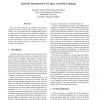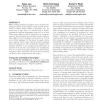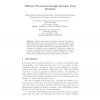151 search results - page 5 / 31 » Using Informal and Formal Techniques for the Reverse Enginee... |
WCRE
2005
IEEE
14 years 1 months ago
2005
IEEE
We apply static analysis and symbolic interpretation techniques to reverse engineer the semantics of legacy assembler code. We examine the case of IBM-1800 programs in detail. Fro...
KCAP
2003
ACM
14 years 22 days ago
2003
ACM
While existing learning techniques can be viewed as inducing programs from examples, most research has focused on rather narrow classes of programs, e.g., decision trees or logic ...
KBSE
2007
IEEE
14 years 1 months ago
2007
IEEE
The proposed research defines an approach to combine Information Retrieval based analysis of the textual information embedded in software artifacts with program static and dynamic...
PLDI
2003
ACM
14 years 22 days ago
2003
ACM
This paper presents a static analysis tool that can automatically find memory leaks and deletions of dangling pointers in large C and C++ applications. We have developed a type s...
WISA
2005
Springer
14 years 28 days ago
2005
Springer
Abstract. Reverse engineering of executable programs, by disassembling them and then using program analyses to recover high level semantic information, plays an important role in a...



